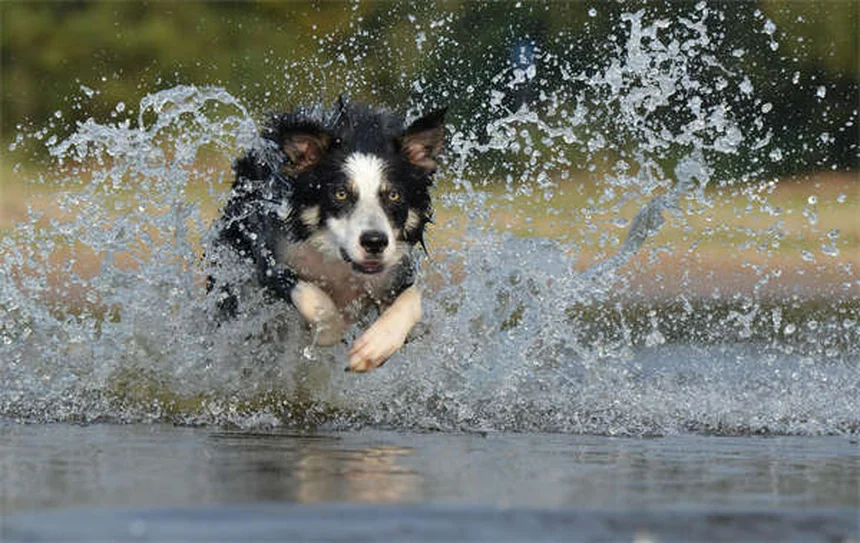Why do horses kick? The answer is simple: horses kick for specific reasons, never just randomly. As prey animals, kicking is their natural defense mechanism - whether they're protecting themselves, their food, or reacting to pain. I've worked with horses for years, and let me tell you, that powerful kick (we're talking 2,000 pounds of force!) is their way of communicating when they feel threatened or uncomfortable.You might think your horse kicked you for no reason, but trust me, there's always a cause. Maybe they're startled by sudden movement behind them (always approach from the side!), or perhaps they're dealing with painful ulcers. Some horses even kick at flies - can you blame them? In this guide, we'll break down the six main reasons horses kick and give you practical solutions to keep both you and your equine friend safe.
E.g. :5 Best Touch Screen Games for Senior Dogs (2024 Guide)
- 1、Understanding Why Horses Kick
- 2、When Kicking Becomes a Problem
- 3、Practical Solutions for Kicking Issues
- 4、Protecting Yourself and Your Horse
- 5、Long-Term Solutions for Happy Horses
- 6、Final Thoughts on Horse Kicking
- 7、Beyond the Kick: Understanding Equine Body Language
- 8、The Science Behind the Strength
- 9、Training Alternatives to Punishment
- 10、When to Call in the Professionals
- 11、FAQs
Understanding Why Horses Kick
The Surprising Power Behind Those Hooves
Let me tell you something that might surprise you - a horse's kick packs more punch than a heavyweight boxing champion! We're talking about 2,000 pounds of impact force that can send you flying. Now, you might wonder - why would these beautiful creatures pack such powerful weapons? Well, it's all about survival in the wild.
Horses don't kick because they're mean or want to hurt you. As prey animals, kicking is their built-in defense system. Imagine you're a horse in the wild - when a predator approaches, your first instinct is to run. But what if you're cornered? That's when those powerful hind legs come into play. It's their way of saying, "Back off!" in the most dramatic way possible.
Common Reasons Horses Kick
Now, let's break down the main reasons why your equine friend might decide to show off those powerful kicks:
| Reason | Example | How to Handle |
|---|---|---|
| Self-defense | Startled by sudden movement | Approach slowly, announce your presence |
| Resource guarding | Protecting food or space | Respect boundaries during feeding time |
| Pain or illness | Colic or gastric ulcers | Call vet immediately |
| Insect irritation | Flies biting legs | Use fly spray and protective gear |
When Kicking Becomes a Problem
 Photos provided by pixabay
Photos provided by pixabay
Is Your Horse Trying to Tell You Something?
Here's something important to remember - horses never kick "just because." There's always a reason, even if we humans don't immediately understand it. I've seen many cases where what seemed like aggressive behavior was actually the horse's way of saying, "Hey, I'm in pain here!"
Think about this: would you kick someone if you didn't have a good reason? Probably not. Horses feel the same way. When they kick, they're either scared, hurting, or trying to protect something important to them. That's why it's crucial to look beyond the behavior itself and understand what's really going on.
Creating a Safe Environment
Now, let's talk about how we can make things safer for both you and your horse. First rule of thumb - never stand directly behind a horse. I know it sounds obvious, but you'd be surprised how many accidents happen this way. Instead, stay close to their side where they can see you.
Here's a pro tip: when you need to walk behind your horse, keep one hand gently touching them as you move. This way, they always know where you are. And please, for your own safety, avoid sitting or lying down near horses - that's just asking for trouble!
Practical Solutions for Kicking Issues
Medical Checkups First
Before you try any behavior modification, here's what I always recommend: schedule a thorough vet check. Why? Because pain is one of the most common reasons for kicking. Your horse might be dealing with:
• Gastric ulcers (ouch!)
• Ovarian issues (for mares)
• Skin irritations or poorly fitting tack
I once worked with a horse who kept kicking at his belly. Turns out he had severe ulcers. After treatment? No more kicking! That's why I always say - rule out medical issues first.
 Photos provided by pixabay
Photos provided by pixabay
Is Your Horse Trying to Tell You Something?
If your vet gives the all-clear health-wise, then we can look at behavior solutions. Here's what's worked for me and many other horse owners:
1. Identify triggers - Keep a log of when kicks happen. Is it during feeding? When other horses approach? This detective work pays off!
2. Use positive reinforcement - Reward good behavior with treats or praise. Horses learn fast when there's something in it for them!
3. Consider professional help - If you're not comfortable working on this alone, don't hesitate to call in an equine behaviorist. Your safety comes first!
Protecting Yourself and Your Horse
Essential Safety Gear
Let's talk about protective equipment - because no one wants to experience that 2,000-pound kick firsthand! Here's what I recommend:
• Always wear a helmet - Even if you're just grooming, not riding
• Sturdy boots - Your toes will thank you
• Body protectors - Especially when working with known kickers
Remember that study I mentioned earlier? It showed that most serious injuries from horse kicks are to the head and face. That helmet could literally save your life!
When to Seek Medical Attention
Here's something scary - some kick injuries don't show immediate symptoms. You might feel fine after being kicked, only to develop serious problems later. That's why I always say: if a horse kicks you, even if it seems minor, get checked by a doctor.
Watch for these warning signs:
• Headache or dizziness
• Abdominal pain
• Difficulty breathing
• Unusual swelling or bruising
Better safe than sorry, right? Your health isn't something to gamble with.
Long-Term Solutions for Happy Horses
 Photos provided by pixabay
Photos provided by pixabay
Is Your Horse Trying to Tell You Something?
Did you know that stress can make horses more likely to kick? It's true! Here are some ways to keep your horse calm and content:
• Maintain a consistent routine - horses thrive on predictability
• Provide plenty of turnout time - no one likes being cooped up!
• Ensure proper socialization - horses are herd animals after all
• Offer mental stimulation - boredom leads to mischief
I've seen dramatic improvements in behavior just by making these simple changes. A happy horse is a well-behaved horse!
The Power of Positive Reinforcement
Here's a question for you: how would you feel if someone only paid attention to you when you did something wrong? Not great, right? Horses feel the same way!
That's why I'm such a big fan of positive reinforcement training. Instead of punishing bad behavior, we reward the good stuff. For example, when your horse stands calmly instead of kicking, give them a treat or some extra scratches. They'll quickly learn that good behavior pays off!
Remember - training isn't about dominating your horse. It's about building trust and understanding. When your horse knows you'll listen to their needs, they're much less likely to resort to kicking to get their point across.
Final Thoughts on Horse Kicking
Respecting the Power
After working with horses for years, here's what I've learned - their kicks are powerful, but they're not malicious. Understanding why horses kick helps us prevent dangerous situations while building better relationships with these magnificent animals.
The key is to always stay alert, respect your horse's boundaries, and address any underlying issues. With patience and proper handling, most kicking behaviors can be improved or eliminated entirely.
Continuing Education
If you're serious about horse safety (and you should be!), I recommend checking out these resources:
• Local equine first aid courses
• Horse behavior seminars
• Books on positive reinforcement training
The more you know, the safer you'll be - and the better you'll understand your equine partner. Now go enjoy your horses, and remember to stay out of kicking range!
Beyond the Kick: Understanding Equine Body Language
The Warning Signs Before the Kick
You know what's fascinating? Horses give us plenty of warning before they kick - if we know what to look for. Their ears pin back, their tail swishes aggressively, and they might even lift a hind leg slightly. These are all clear signals saying "I'm uncomfortable!" I've watched countless new horse owners miss these cues, then act surprised when the kick comes.
Here's a personal story that might help you understand. Last summer at the ranch, we had a mare named Daisy who'd suddenly start swishing her tail like a windshield wiper on high speed whenever someone approached her right side. At first, people thought she was just shooing flies. But when we investigated further? Turns out she had a sensitive spot from an old injury. Once we addressed that, the tail swishing - and subsequent kicking - stopped completely.
Building Trust Through Communication
Ever notice how some horses seem to "talk" with their whole bodies? That's because they do! While we humans rely heavily on verbal communication, horses are masters of nonverbal cues. Their ear position, eye expression, even how they hold their heads tell us volumes about how they're feeling.
Let me ask you this - when was the last time you really watched your horse's face for subtle changes? Most people don't realize that a horse's eyes can show fear, curiosity, or annoyance just as clearly as ours can. Next time you're with your horse, try this experiment: stand quietly and observe their facial expressions as different things happen around them. You'll start seeing patterns that help predict when they might feel kicky.
The Science Behind the Strength
Muscle Power: More Than Meets the Eye
Here's something that blew my mind when I first learned it - a horse's hindquarters contain some of the most powerful muscles in the animal kingdom. We're talking about muscles that can propel a 1,000-pound animal at speeds up to 55 mph in just a few strides! That same explosive power gets channeled into their kicks.
Check out this comparison between horse kicks and other powerful impacts:
| Impact Source | Force (pounds) | Equivalent To |
|---|---|---|
| Average horse kick | 2,000 | Getting hit by a small car at 20 mph |
| Professional boxer's punch | 1,300 | Getting hit by a baseball at 90 mph |
| Football tackle | 1,600 | Falling from a second story window |
See what I mean? That kick isn't just strong - it's potentially deadly. But here's the good news - understanding this power helps us respect it properly.
The Physics of Survival
Why did evolution give horses such powerful kicks anyway? Think about their wild ancestors on the open plains. When wolves or other predators attacked, the horses that could deliver the most damaging kicks were more likely to survive and reproduce. Over thousands of years, this created the incredible kicking power we see today.
It's kind of amazing when you think about it - that same survival instinct still exists in our domesticated horses today. Even though your pasture-raised gelding has never seen a wolf, his DNA still remembers the danger. That's why some horses kick at sudden movements behind them - their instincts scream "Predator!" even when it's just a plastic bag blowing in the wind.
Training Alternatives to Punishment
Why Traditional Methods Often Fail
Here's a hard truth I've learned over the years - punishing a horse for kicking usually makes the problem worse. I've seen people yell, hit, or isolate kicking horses, only to create more anxious, reactive animals. It's like trying to put out a fire with gasoline!
Think about it from the horse's perspective. If you're kicking because you're scared or in pain, and someone responds by scaring or hurting you more... well, that just confirms your belief that you needed to defend yourself in the first place! It's a vicious cycle that damages trust without solving the underlying issue.
Modern Approaches That Actually Work
So what does work? In my experience, these methods produce lasting results:
1. Desensitization training - Gradually exposing the horse to scary stimuli in a controlled way. Start with the stimulus at a distance where the horse notices but stays calm, then slowly decrease the distance over multiple sessions.
2. Counterconditioning - Pairing the scary thing with something positive. For example, if your horse kicks when touched on the legs, start by touching lightly while feeding treats, gradually increasing pressure as they relax.
3. Clicker training - Using a distinct sound (the click) to mark desired behaviors the instant they occur, followed by a reward. This precise communication helps horses understand exactly what you want.
I've used these methods with everything from show horses to rescue cases, and the results speak for themselves. Horses learn faster, retain the lessons longer, and our relationships with them become stronger in the process.
When to Call in the Professionals
Recognizing Your Limits
Here's something I wish more horse owners understood - there's no shame in asking for help with a kicking problem. In fact, it shows wisdom and responsibility. I've had to call in behavior specialists myself a few times over the years, and each time I learned valuable techniques that made me a better horseman.
How do you know when it's time to call a pro? Watch for these red flags:
• The kicking is escalating in frequency or intensity
• You're feeling nervous or unsure around your horse
• Multiple people have been injured
• Your training attempts haven't shown improvement after several weeks
Remember - your safety comes first. A good professional won't judge you for seeking help; they'll respect you for prioritizing everyone's wellbeing.
Finding the Right Expert
Not all horse trainers are created equal when it comes to solving kicking issues. Here's what to look for in a qualified professional:
1. Specialized experience - Ask how many kicking cases they've successfully resolved. The more, the better!
2. Positive methods - Avoid anyone who relies heavily on punishment or "breaking" techniques. Modern science supports kinder approaches.
3. Good references - Talk to their previous clients. Happy customers with long-term results are the best endorsement.
4. Insurance - Any legitimate professional will carry liability insurance. Don't be shy about asking to see proof.
Investing in the right help now can prevent years of frustration - and potentially save you from serious injury down the road.
E.g. :Getting kicked by a horse : r/Horses
FAQs
Q: Can a horse kick kill you?
A: Absolutely, and that's why you should never take horse kicks lightly. A horse's kick delivers about 2,000 pounds of force - more than twice the power of a heavyweight boxer's punch! I've seen cases where kicks caused severe fractures, traumatic brain injuries, or even fatal internal bleeding. The most dangerous kicks are to the head or abdomen. That's why we always recommend wearing a helmet around horses, even when you're just grooming them. If you do get kicked, don't tough it out - seek medical attention immediately, as some serious injuries don't show symptoms right away.
Q: Why does my horse kick when eating?
A: This is classic resource guarding behavior, and it's more common than you might think. In your horse's mind, that food pile means survival, so they'll defend it just like they would against a predator. Some horses are naturally more protective, while others might do this because of past trauma or even gastric pain (ulcers make horses cranky around meal times). My advice? Always maintain a safe barrier during feeding, and consider having your vet check for underlying health issues that might be contributing to this behavior.
Q: How can I tell if my horse is kicking due to pain?
A: Pain-related kicking often has distinct signs. If your horse is repeatedly kicking at their belly, especially while looking at their sides, sweating, or refusing food, they might be experiencing colic - a veterinary emergency. Other pain indicators include kicking only when touched in specific areas or during certain activities (like saddling). I always tell clients: when in doubt, call your vet. It's better to be safe than sorry, and many pain-related kicking behaviors disappear once the underlying issue is treated.
Q: What should I do if my horse starts kicking suddenly?
A: Sudden behavior changes always warrant a veterinary examination first. In my experience, abrupt kicking is often the horse's way of saying "I hurt!" Once medical causes are ruled out, start observing when the kicking occurs. Keep a log of triggers - is it during grooming? When other horses approach? This detective work helps identify patterns. For safety, I recommend working with an equine behaviorist if the kicking persists, especially if it's directed at people. Remember: never punish kicking, as this usually makes the problem worse.
Q: How can I prevent my horse from kicking?
A: Prevention starts with understanding why your horse kicks in the first place. For fly-related kicking, quality fly spray and protective gear work wonders. If it's behavioral, positive reinforcement training is incredibly effective - reward calm behavior with treats or scratches. Always approach horses safely (never directly from behind!), and maintain a low-stress environment with plenty of turnout time. One pro tip I've found helpful: when walking behind a horse, keep one hand gently on their hindquarters so they always know where you are. Consistency is key - most kicking behaviors can be improved with patience and proper handling.



Discuss